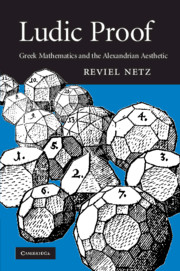3 - Hybrids and mosaics
Published online by Cambridge University Press: 29 July 2009
Summary
Euclid's Elements stand out, among Hellenistic mathematical works, in their pedagogic intent. Yet their very end – book xiii – already suggests the ludic, and at the very end is a theorem, attached as a kind of appendix, that would have been worthy of Archimedes. The theorem is often considered to have been discovered early (though its form may be due to Euclid himself, or even to some later reader of him). However this may be, it may serve as an example of an important compositional phenomenon: the mosaic proof. Here then is the proof that there are exactly five regular solids (adapted from Heath's translation):
(1) For a solid angle cannot be constructed with two triangles (or, in general, <two> planes). [This is based on a definition in book xi and in principle represents a fundamental three-dimensional intuition.] (2) With three triangles the angle of the pyramid is constructed, with four the angle of the octahedron, and with five the angle of the icosahedron [this moves into the mode of exhaustive survey]; (3) but a solid angle cannot be formed by six equilateral and equiangular triangles placed together at one point, (4) for, the angle of the equilateral triangle being two-thirds of a right angle, (5) the six will be equal to four right angles: (6) which is impossible, (7) for any solid angle is contained by angles less than four right angles. [Step 7 is a result proved at Elementsxi.21. […]
- Type
- Chapter
- Information
- Ludic ProofGreek Mathematics and the Alexandrian Aesthetic, pp. 115 - 173Publisher: Cambridge University PressPrint publication year: 2009



